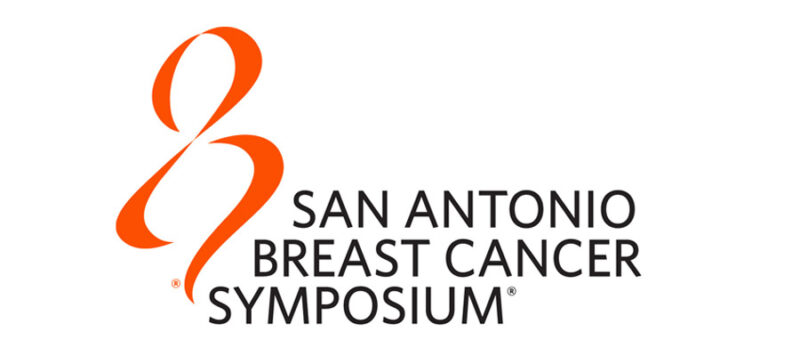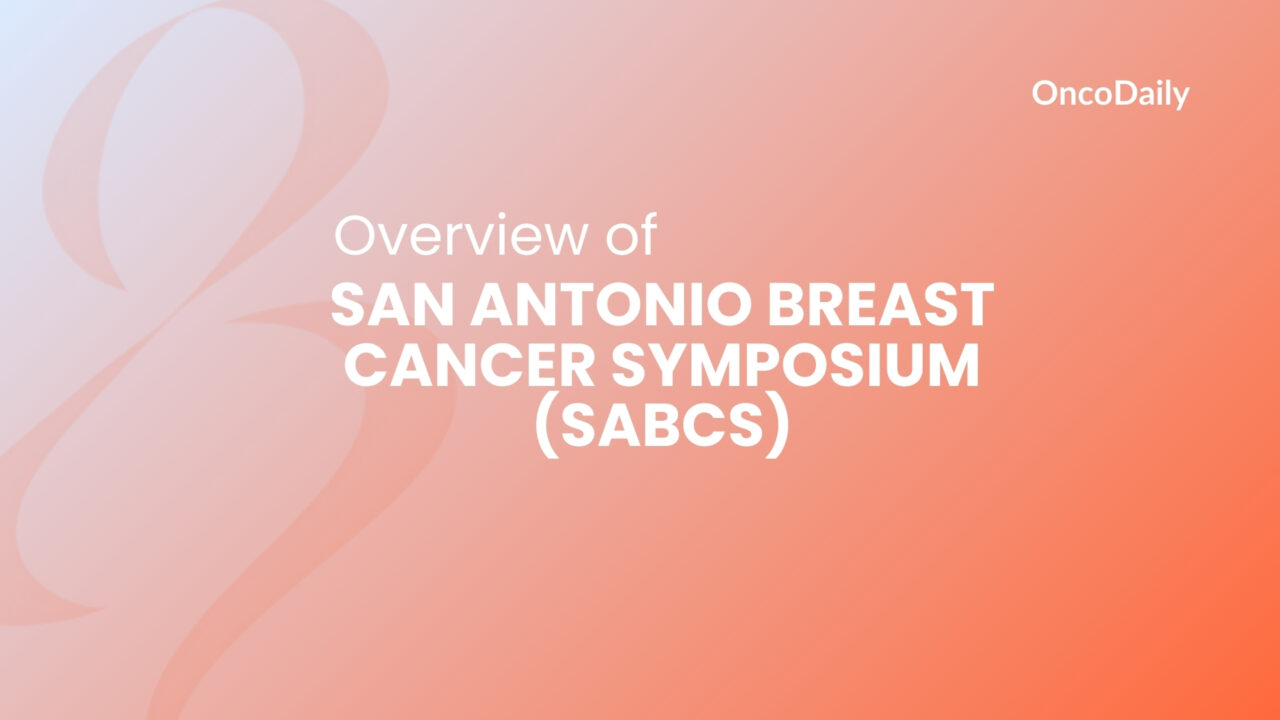History of SABCS: Key Milestones
Established in 1978 by Drs. William McGuire and Charles Coltman, the San Antonio Breast Cancer Symposium (SABCS) began as a small meeting in San Antonio, Texas, with fewer than 50 attendees. Despite its modest start, it featured notable speakers like Drs. Bernard Fisher and Marc Lippman.
By introducing abstract presentations to connect clinicians and researchers, SABCS quickly gained prominence, moving to larger venues and attracting thousands of participants from over 100 countries by the late 1990s, becoming the world’s leading breast cancer research meeting.
In 1998, SABCS featured the ATAC trial, which marked a major advancement in hormone therapy. The study showed that anastrozole was more effective than tamoxifen for postmenopausal women with early-stage breast cancer. It reduced cancer recurrence and had fewer side effects, offering patients a safer and more effective option. By 2005, SABCS presented the results for trastuzumab (Herceptin), a breakthrough for HER2-positive breast cancer. Herceptin reduced the risk of cancer returning by 50%, significantly improving survival for women with this aggressive subtype.
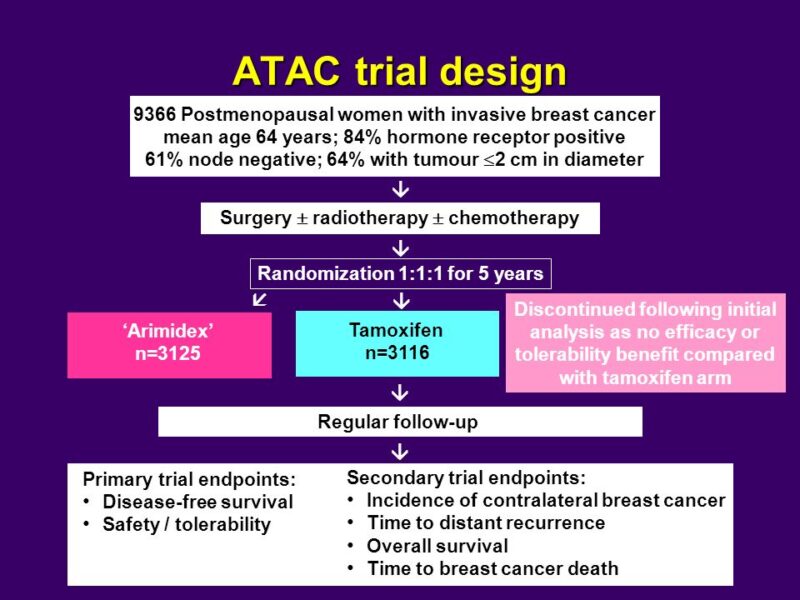
In 2012, the TAILORx trial introduced a new era of personalized treatment. It proved that women with hormone receptor-positive early-stage breast cancer and low Oncotype DX scores could safely avoid chemotherapy, relying on hormone therapy alone. This spared many patients from unnecessary treatment and its harsh side effects.The 2014 introduction of CDK4/6 inhibitors, such as palbociclib, brought hope to women with hormone receptor-positive metastatic breast cancer. These targeted therapies slowed cancer progression by about 50%, allowing patients to live longer with a better quality of life.
The KEYNOTE-522 trial (2019), led by Dr. Sherene Loi, assessed pembrolizumab combined with chemotherapy for early-stage TNBC. Results showed a 64.8% complete remission rate before surgery compared to 51.2% with chemotherapy alone, providing new hope for patients with this challenging subtype.
In 2022, the DESTINY-Breast04 trial transformed treatment for HER2-low breast cancer, a group with limited options. The results showed that trastuzumab deruxtecan (T-DXd) significantly slowed cancer progression and extended survival, offering new hope for patients.
SABCS Mission and Vision
A core value of SABCS is innovation, serving as a platform for presenting research and facilitating the rapid transition of new knowledge from the laboratory to clinical practice. Patient-centered research is integral to SABCS’s mission, with the symposium’s program designed to provide state-of-the-art information on various aspects of breast cancer, etiology, prevention, diagnosis, and therapy.
Through its commitment to innovation, patient-centered research, and global collaboration, SABCS continues to play a pivotal role in the fight against breast cancer, influencing practice-changing guidelines, inspiring novel studies, and fostering international partnerships that drive the field forward.
How SABCS Advances Breast Cancer Research
SABCS’s collaborative environment drives innovation by connecting diverse stakeholders and facilitating the dissemination of cutting-edge findings. This approach has enabled significant advancements in breast cancer treatment, shaping clinical practice and improving outcomes for patients globally.
The IMpassion130 trial (2018), led by Dr. Peter Schmid, evaluated the combination of atezolizumab with nab-paclitaxel for metastatic triple-negative breast cancer (TNBC). The study demonstrated a 38% improvement in progression-free survival, offering patients extended time without disease progression and marking a milestone in immunotherapy for breast cancer.
At SABCS 2021, Dr. Fabrice André presented findings from the SAFIR trials, highlighting the role of genomic profiling in guiding personalized treatments for metastatic breast cancer. Outcomes improved for 42% of patients, reducing unnecessary therapies and emphasizing the importance of actionability in treatment decisions.
In 2023, Dr. Nicholas Turner shared research on genomic and transcriptomic profiling for HR-positive, HER2-negative, high-risk early breast cancer patients. The study supported the use of abemaciclib, which reduced the risk of cancer recurrence by 30%, offering patients a greater chance of remaining cancer-free.
SABCS 2024: Key Details
The 2024 San Antonio Breast Cancer Symposium (SABCS) was held from December 10th to 13th, 2024, at the Henry B. Gonzalez Convention Center in San Antonio, Texas.
- Advances in Early Detection: Study on Ductal Carcinoma In Situ (DCIS): Dr. E. Shelley Hwang presented findings indicating that active monitoring of low-risk DCIS is as effective as surgery in preventing progression to invasive cancer over two years. In the trial involving 957 women, invasive cancer rates were 5.9% in the surgery group and 4.2% in the monitoring group, a difference that was not statistically significant.
- New Treatments: Pfizer’s Ibrance (Palbociclib): Dr. Otto Metzger reported that adding Ibrance to standard treatment extended progression-free survival by 15 months in patients with hormone receptor-positive and HER2-positive metastatic breast cancer. The median time to disease progression was 44.3 months with Ibrance, compared to 29.1 months with standard treatment alone.
- Clinical Trial Data: Trends in Breast Cancer Diagnosis: Research presented by Dr. Debra Monticciolo highlighted a significant increase in late-stage breast cancer diagnoses in the U.S. from 2004 to 2021. The incidence of metastatic breast cancer at diagnosis rose by an average of 1.16% per year, with the most substantial annual increase of 2.9% observed in women aged 20 to 39.
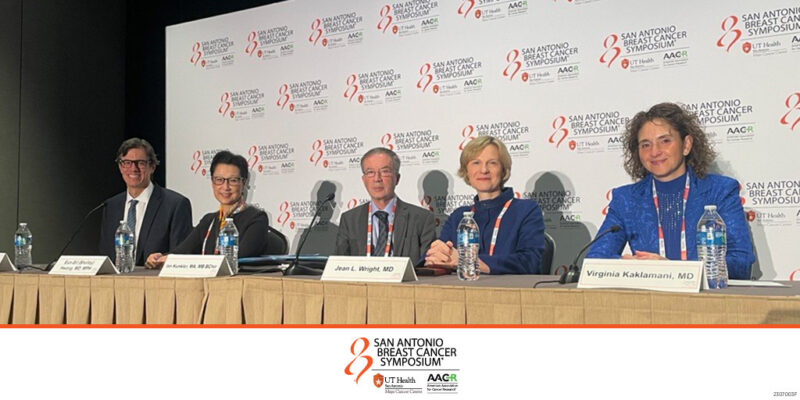
Breakthrough Research from Past SABCS Meetings
At the 2024 San Antonio Breast Cancer Symposium (SABCS), Dr. Fergus Couch presented groundbreaking findings on variants of uncertain significance (VUS) in the BRCA2 gene, utilizing advanced CRISPR/Cas9 technology. In this comprehensive study, supported by the Breast Cancer Research Foundation (BCRF), Dr. Couch and his team simultaneously analyzed over 7,000 VUS within the DNA-binding domain of the BRCA2 gene, a region accounting for about one-third of the entire gene.
Out of the 7,000 variants, the team classified 785 variants as pathogenic or likely pathogenic, meaning these are associated with an increased risk of breast cancer. An additional 5,569 variants were determined to be benign or likely benign, indicating no significant impact on cancer risk. This study provides actionable insights, particularly for individuals carrying one of the 785 pathogenic variants, offering improved risk prediction and potentially guiding preventive care or treatment strategies.
Significantly, this research expands understanding of VUS in non-white populations, addressing a longstanding gap in genetic research as most prior studies focused on white women.
Additionally, Dr. Judy Garber, Scientific Director at BCRF, presented long-term findings from the OlympiA trial (NCT02032823). This study evaluated the addition of one year of olaparib a PARP inhibitor, after standard treatment for high-risk breast cancer in patients with pathogenic germline BRCA variants.
Follow-up over six years demonstrated sustained benefits, with a 4.4% improvement in overall survival (87.5% vs. 83.1%) compared to standard care alone.
The trial also reported an improvement of 9.4% in invasive disease-free survival (iDFS) and 7.8% in distant disease-free survival (DDFS), showing durable protection against cancer recurrence in this high-risk population.
How to Prepare for SABCS
Here are some quick tips to maximize your SABCS 2025 experience
- Register Early: Secure discounted rates and your spot for popular sessions.
- Plan Your Sessions: Use the SABCS app to customize your schedule and stay updated.
- Network: Take part in interactive sessions and social events to connect with peers and experts.
- Accommodation: Book through the official SABCS housing provider for the best rates.
- Prepare for On-Site: Speakers should use the Speaker Ready Room for session prep. Patient advocates have dedicated spaces for support
SABCS 2025: What to Expect
The San Antonio Breast Cancer Symposium (SABCS) 2025 is poised to continue its legacy as a premier global event in breast cancer research, bringing together leading oncologists, researchers, and healthcare professionals to discuss the latest advancements in prevention, diagnosis, and treatment. Scheduled for December 9–12, 2025, at the Henry B. González Convention Center in San Antonio, Texas, the symposium will focus on pivotal themes such as immunotherapy, precision oncology, and cutting-edge technologies shaping the future of breast cancer care.
SABCS 2025 is expected to highlight pivotal advancements in molecular oncology, particularly in decoding the genetic and molecular drivers of breast cancer. Researchers will delve into novel diagnostic tools such as liquid biopsy technology and next-generation sequencing (NGS), which are making early detection and real-time monitoring of cancer more accessible and effective.
Personalized treatments for breast cancer subtypes will also take center stage. This includes updates on targeted therapies for hormone receptor-positive (HR+) cancers, such as CDK4/6 inhibitors and novel SERDs (selective estrogen receptor degraders), which are reshaping the treatment landscape. For HER2-positive breast cancer, new antibody-drug conjugates (ADCs) and dual HER2-targeting strategies will be discussed, offering hope for patients with resistant or advanced disease.
CAR-T cell therapy, an innovative immunotherapy, is anticipated to be a major focus. Early-phase trials have shown promising results in treating solid tumors, including triple-negative breast cancer (TNBC), and updates on efficacy, safety, and scalability of this treatment will likely generate significant interest.
Precision oncology will remain at the forefront, with sessions dedicated to improving outcomes through genomic profiling, artificial intelligence (AI)-driven diagnostics, and predictive biomarkers. Discussions on integrating molecular data into clinical decision-making will highlight how tailored approaches can optimize treatments for patients with rare and challenging breast cancer subtypes. SABCS 2025 will feature renowned oncologists and researchers, including:
- Dr. Hope Rugo (UCSF), an authority on targeted therapies and ADCs.
- Dr. Sherene Loi (Peter MacCallum Cancer Centre), a leader in immunotherapy for TNBC.
- Dr. Fabrice André (Institut Gustave Roussy), known for his work in genomic profiling and precision medicine.
- Dr. Ian Krop (Dana-Farber Cancer Institute), a pioneer in HER2-positive breast cancer treatments.
SABCS Research Submission Standards
The San Antonio Breast Cancer Symposium (SABCS) upholds strict ethical standards to ensure scientific integrity.
- Submission Requirements: Abstracts must be original, not previously published or presented, and meet rigorous research and ethical guidelines.
- Conflict of Interest Policies: All presenters must disclose financial relationships that could influence their work. These disclosures are reviewed to ensure transparency and avoid bias.
- Scientific Integrity: Research must adhere to ethical guidelines, including IRB approval and informed consent. Data must be accurate and transparent, with no manipulation or selective reporting.
SABCS’s Influence on Breast Cancer Research Practices
At SABCS 2024,
Dr. Komal Jhaveri of the
Dana-Farber Cancer Institute presented the results of the
EMBER3 trial (NCT04975308), a study evaluating
imlunestrant, a next-generation oral selective estrogen receptor degrader (SERD). The trial demonstrated significant benefits for patients with
estrogen receptor-positive/HER2-negative advanced breast cancer, particularly those with
ESR1 mutations:
- Imlunestrant monotherapy reduced the risk of disease progression and death by 38% in patients with ESR1 mutations.
- When combined with abemaciclib, progression-free survival improved by more than 9.4 months across all patients, regardless of ESR1 mutation status.
These findings highlight imlunestrant’s potential as a more convenient alternative to fulvestrant, the only currently approved SERD, which is administered via injection. If approved by the FDA, imlunestrant could significantly enhance the quality of life for patients by offering an effective oral treatment option, showcasing SABCS’s role in advancing patient-centered care.
The research presented at SABCS directly influences practice guidelines, such as those from the American Society of Clinical Oncology (ASCO) and National Comprehensive Cancer Network (NCCN).
Virtual Access to SABCS Content
SABCS provides on-demand access for virtual attendees, offering recorded sessions from keynotes, panels, and research talks that can be viewed anytime during and after the symposium. Virtual attendees can also engage in interactive features like live Q&A, discussion forums, and networking, allowing real-time interaction with experts and peers. This option ensures that professionals can stay updated on the latest breast cancer advancements, even if they cannot attend in person.
Benefits of Attending SABCS for Professional Growth
The San Antonio Breast Cancer Symposium (SABCS) offers significant career advancement opportunities for professionals in breast cancer research and clinical care. By providing access to the latest research, fostering global networking, and celebrating scientific excellence, SABCS has established itself as a vital platform for professional development and collaboration.
SABCS showcases transformative studies that shape the future of breast cancer care. For example:
- Dr. Laura J. van ’t Veer, a Breast Cancer Research Foundation (BCRF) investigator since 2014, was awarded the William L. McGuire Memorial Lecture Award for her contributions to breast cancer risk stratification and molecular subtyping. Her invention of MammaPrint, a genomic test analyzing 70 genes to predict recurrence, has become a cornerstone in personalized treatment. Additionally, her leadership in the I-SPY trials established a biomarker bank and predictive subtypes, significantly advancing precision oncology.
- Dr. Christina Curtis, a BCRF investigator since 2011, received the AACR–Breast Cancer Research Foundation Outstanding Investigator Award for her work on the molecular determinants of breast cancer. Her research has identified new subgroups, refined relapse predictions, and enhanced biomarker development, enabling more accurate patient stratification. Dr. Curtis attributes her innovative research success to the support of BCRF.
- Dr. Steffi Oesterreich, also a BCRF investigator since 2011, was recognized with the AACR Distinguished Lectureship in Breast Cancer Research for her translational work on invasive lobular carcinoma (ILC). Her findings redefined ILC as a distinct biological entity from invasive ductal carcinoma (IDC), contributing to novel treatment approaches tailored to ILC patients.
SABCS facilitates collaboration among global experts in oncology, creating opportunities for professionals to engage in meaningful discourse, establish partnerships, and explore innovative ideas. The presence of eminent researchers such as Drs. van ’t Veer, Curtis, and Oesterreich underscores the symposium’s ability to unite leading minds in the field.
The symposium also recognizes outstanding contributions through its prestigious awards. In 2024, three BCRF investigators were honored with the Susan G. Komen Brinker Awards:
- Dr. Christina Curtis for Basic Science,
- Dr. Fabrice André for Clinical Research,
- Dr. Graham Colditz for Population Science (inaugural award).
How to Stay Updated on SABCS News and Events
Staying informed about the San Antonio Breast Cancer Symposium (SABCS) and the latest breast cancer research is easy with these resources:
- Subscribe to the SABCS Newsletter: Sign up for the SABCS mailing list to get regular updates on symposium details, registration deadlines, and groundbreaking research. This ensures you never miss important announcements or opportunities.
- Follow SABCS on Social Media: Stay connected and up-to-date by following SABCS on Twitter, Facebook , LinkedIn
- Visit the Official Website: Check the SABCS website regularly for event updates, program schedules, and access to resources that keep you informed about the latest in breast cancer care.
By using these tools, you’ll have direct access to key information, helping you stay ahead in the field and remain connected to the global breast cancer research community.
Exploring Innovation at SABCS: Technology and Research
At the 2024 San Antonio Breast Cancer Symposium (SABCS), advancements in artificial intelligence (AI) demonstrated transformative potential in breast cancer diagnostics and early detection. Notably, a study focused on AI-driven short-term breast cancer risk assessment based on mammographic images yielded impressive results
- The AI model accurately stratified breast cancer risk across diverse populations, showing consistent performance regardless of race or breast density.
- Detection rates for invasive cancers increased by 13%, particularly benefiting individuals with dense breast tissue, which is often challenging for traditional mammography.
- The system enhanced the accuracy of identifying smaller tumors, enabling earlier diagnosis and intervention.
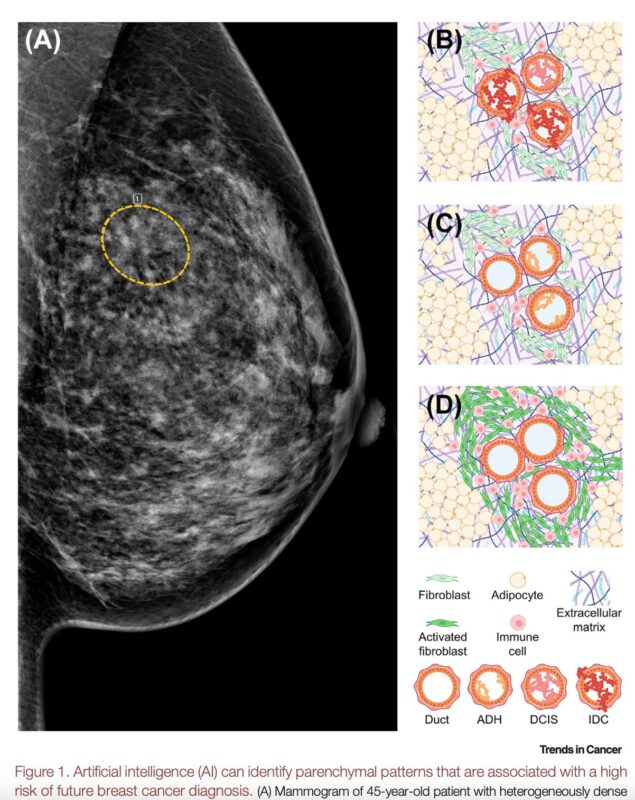
Source: Eric Topol X
These findings underscore AI’s ability to address disparities in breast cancer screening, offering equitable diagnostic accuracy for underserved populations and improving early detection outcomes. By leveraging machine learning algorithms, AI tools are shaping the future of breast cancer care, making it more precise and accessible for all patients.
SABCS’s Role in Supporting Patient-Centered Research
The San Antonio Breast Cancer Symposium (SABCS) emphasizes patient-centered research by collaborating with advocacy groups and integrating patient perspectives into breast cancer studies. These partnerships bridge the gap between researchers and patients, ensuring that scientific advancements address real-world needs and improve outcomes.
At SABCS, patient-focused sessions play a critical role. Advocate Poster Walks guide discussions, connecting scientific findings to their practical implications for patients. Dedicated symposiums provide a platform for patients to share their experiences, shaping research priorities and fostering alignment between scientific goals and patient needs. Workshops on survivorship and quality of life further highlight challenges like mental health and long-term care, helping researchers and clinicians focus on holistic care.
By including patient voices, SABCS enhances the relevance of breast cancer research, driving innovations that not only advance treatments but also improve the overall patient experience. This collaborative approach ensures that breast cancer care remains compassionate, accessible, and impactful.
You Can Watch More on OncoDaily Youtube TV
Written by Nare Hovhannisyan, MD
